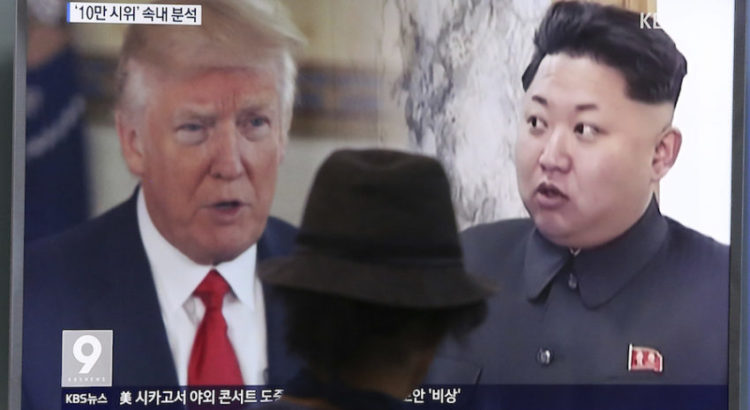By. Henry Giroux
Ignorance is a terrible wound when it is self-inflicted, but it becomes a dangerous plague when the active refusal to know combines with power. President Trump’s lies, lack of credibility, woefully deficient knowledge of the world, and unbridled narcissism have suggested for some time that he lacks the intelligence, judgment and capacity for critical thought necessary to occupy the presidency of the United States. But when coupled with his childish temperament, his volatile impetuousness and his Manichaean conception of a world—a reductionist binary that only views the world in term of friends and enemies, loyalists and traitors—his ignorance translates into a confrontational style that puts lives, if not the entire planet, at risk.
Trump’s seemingly frozen and dangerous fundamentalism, paired with his damaged ethical sensibility, suggests that we are dealing with a form of nihilistic politics in which the relationship between the search for truth and justice on the one hand and moral responsibility and civic courage on the other has disappeared. For the past few decades, as historian Richard Hofstadter and others have reminded us, politics has been disconnected not only from reason but also from any viable notion of meaning and civic literacy. Government now runs on willful ignorance as the planet heats up, pollution increases and people die. Evidence is detached from argument. Science is a subspecies of “fake news,” and alternative facts are as important as the truth. Violence becomes both the catalyst and the result of the purposeful effort to empty language of any meaning. Under such circumstances, Trump gives credence to the notion that lying is now a central feature of leadership and should be normalized, and this serves as an enabling force for violence.
For Trump, words no longer bind. Moreover, his revolting masculinity now stands in for dialogue and his lack of an ethical imagination. Trump has sucked all of the oxygen out of democracy and has put into play a culture and mode of politics that kill empathy, revel in cruelty and fear and mutilate democratic ideals. Trump’s worldview is shaped by Fox News and daily flattering and sycophantic news clips, compiled by his staff, that boost his deranged need for emotional validation.
All of this relieves him of the need to think and empathize with others. He inhabits a privatized and self-indulgent world in which tweets are perfectly suited to colonizing public space and attention with his temper tantrums, ill-timed provocations, and incendiary vocabulary. His call for loyalty is shorthand for developing a following of stooges who offer him a false and egregiously grotesque sense of community—one defined by a laughable display of ignorance and a willingness to eliminate any vestige of human dignity.
Anyone who communicates intelligently is now part of the “fake news” world that Trump has invented. Language is now forced into the service of violence. Impetuousness and erratic judgment have become central to Trump’s leadership, one that is as ill-informed as it is unstable. Trump has ushered in a kind of anti-politics and mode of governance in which any vestige of informed judgment and thought is banished as soon as it appears. His rigid, warlike mentality has created an atmosphere in the United States in which dialogue is viewed as a weakness and compromise understood as personal failing.
As Hofstadter argued more than 50 years ago, fundamentalist thinking is predicated on an anti-intellectualism and the refusal to engage other points of view. The “other” is not confronted as someone worthy of respect but as an enemy, a threatening presence that must be utterly vanquished—and in Trump’s case, humiliated and then destroyed.
Philosopher Michel Foucault elucidated the idea that fundamentalists do not confront the other as “a partner in the search for the truth but an adversary, an enemy who is wrong, who is harmful, and whose very existence constitutes a threat. … There is something even more serious here: in this comedy, one mimics war, battles, annihilations, or unconditional surrenders, putting forward as much of one’s killer instinct as possible.”
Trump is missing a necessity in his fundamentalist toolbox: self-reflection coupled with informed judgment. He lacks the ability to think critically about the inevitable limitations of his own arguments, and he is not held morally accountable to the social costs of harboring racist ideologies and pushing policies that serve to deepen racist exclusions, mobilize fear and legitimize a growing government apparatus of punishment and imprisonment. What connects the moral bankruptcy of right-wing ideologues such as Trump and his acolytes—who embrace violent imagery to mobilize their followers with the mindset of religious and political extremists—is that they share a deep romanticization of violence that is valorized by old and new fundamentalisms.
The current crisis with North Korea represents not only the possibility of a nuclear war triggered by the irrational outburst of an unhinged leader, but also a death-dealing blow to the welfare state, young people, immigrants, Muslims and others deemed dangerous and therefore “disposable.”
Trump has replaced politics with the theater and poison of nihilism. His politics combines spectacle with vengeance, violence and a culture of cruelty. Trump’s impetuous and badly informed comments about North Korea represent more than a rash, thoughtless outburst. Rather, they contribute to rising tensions and the increased possibility of a major military conflict. Trump’s dangerous rhetoric is symptomatic of the death of historical consciousness, public memory, critical thinking and political agency itself at the highest levels of governance. Under such circumstances, politics degenerates into dogma coupled with a game-show mentality symptomatic of a perpetual form of political theater that has morphed into a new kind of mass mediated barbarism. This is how democracy ends, with a bang and a whimper.
Source:







 Users Today : 35
Users Today : 35 Total Users : 35460244
Total Users : 35460244 Views Today : 43
Views Today : 43 Total views : 3418938
Total views : 3418938